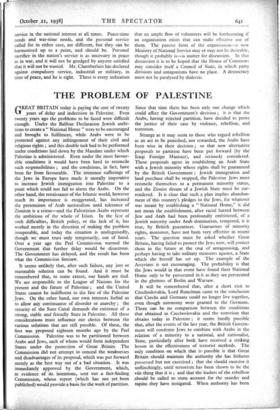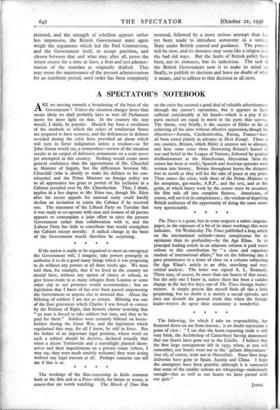THE PROBLEM OF PALESTINE
GREAT BRITAIN today is paying the cost of twenty years of delay and indecision in Palestine. Even twenty years ago the problems to be faced were difficult enough. Under the Balfour Declaration Jewish ambi- tions to create a " National Home " were to be encouraged and brought to fulfilment, while Arabs were to be protected against any infringement of their civil and religious rights ; and this double task had to be performed under conditions laid down by the Mandate under which Palestine is administered. Even under the most favour- able conditions it would have been hard to reconcile such responsibilities ; and the conditions, in fact, have been far from favourable. The immense sufferings of the Jews in Europe have made it morally imperative to increase Jewish immigration into Palestine to a point which could not fail to alarm the Arabs. On the other hand, the renaissance of the Islamic world, however much its importance is exaggerated, has increased the pretensions of Arab nationalism until tolerance of Zionism is a crime—and the Palestinian Arabs represent the ambitions of the whole of Islam. In the fac:e of such difficulties, British policy, or the lack of it, has worked merely in the direction of making the problem insuperable, and today the situation is undisguisedly, though we must trust only temporarily, out of hand. Over a year ago the Peel Commission warned the Government that further delay would be disastrous. The Government has delayed, and the result has been what the Commission foresaw.
It seems unlikely that, after such failure, any just or reasonable solution can be found. And it must be remembered that, to some extent, our hands are tied. We are responsible to the League of Nations for the present and the future of Palestine ; and the United States cannot be indifferent to the fate of the Palestine Jews. On the other hand, our own interests forbid us to allow any continuance of disorder or anarchy ; the security of the Suez Canal demands the existence of a strong, stable and friendly State in Palestine. All these considerations must influence our choice between the various solutions that are still possible. Of these,, the first was proposed eighteen months ago by the Peel Commission. Palestine was to be partitioned between Arabs and Jews, each of whom would form independent States under the protection of Great Britain. The Commission did not attempt to conceal the weaknesses and disadvantages of its proposal, which was put forward merely as the best way out of a bad situation. It was immediately approved by the Government, which, as evidence, of its intentions, sent out a fact-finding Commission, whose report (which has not yet been published) would provide a basis for the work of partition. Since that time there has been only one change which could affect the Government's decision ; it is that the Arabs, having rejected partition, have decided to prove the justice of their case by violence, rebellion, and terrorism.
Strange as it may seem to those who regard rebellion as an act to be punished, not rewarded, the Arabs have been wise in their decision ; so that now alternative proposals to partition have been put forward (by the Iraqi Foreign Minister), and seriously considered. These proposals agree in establishing an Arab State with a Jewish minority whose rights shall be guaranteed by the British Government ; Jewish immigration and land purchase shall be stopped, the Palestine Jews must reconcile themselves to a permanent minority status, and the Zionist dream of a Jewish State must be sur- rendered. It is clear that such a plan implies abandon- ment of this country's pledges to the Jews, for whatever was meant by establishing a " National Home," it, did not mean the establishment, after racial hatred between Jew and Arab had been profoundly embittered, of a Jewish minority under Arab domination, tempered, it is true, by British guarantees. Guarantees of minority rights, moreover, have not been very effective in recent years. The question must be asked whether Great Britain, having failed to protect the Jews now, will protect - them in the future at the cost of antagonising, and perhaps having to take military measures against, a State which she herself has set up. The example of the Assyrians is not encouraging. The probability is that the Jews would in that event have found their National Home only to be persecuted in it as they are persecuted in the ghettoes of Berlin and Warsaw.
It will be remembered that, after a short visit to Czechoslovakia, Lord Runciman came to the conclusion that Czechs and Germans could no longer live together, even though autonomy were granted to the Germans. There can be no comparison between the conditions that obtained in Czechoslovakia and the terrorism that obtains today in Palestine ; it seems hardly possible that, after the events of the last year, the British Govern- ment will condemn Jews to combine with Arabs in the relation of a minority to a national, and nationalist, State, particularly after both have received a striking lesson in the effectiveness of terrorist methods. The only condition on which that is• possible is that Great .Britain _should maintain the authority she has hitherto possessed but not exercised ; that she should exercise it unflinchingly, until terrorism, has been shown to be the Nile thing that it is ; and that the leaders of the rebellion ,should be called to stern account for the murder and rapine ,they have instigated. When authority has been restored, and the strength of rebellion appears rather less impressive, the British Government. must again weigh the arguments which led the Peel Commission, and the Government itself; to accept partition, and choose between that and what may, after all, prove the wisest course for a time at least, a firm and just adminis- tration of the mandate as originally drafted. This may mean the maintenance of the present administration for an indefinite period, until order has been completely restored, followed by a more serious attempt than has yet been . made: to introduce autonomy in a unitary State under British control and guidance. The process Will be slow, and its slowness may seem like a relapse into the bad old ways. But the faults of British policy have been, not its slowness, but its: indecision. The task of the British Government now is to make its mind up finally, to publish its decision and leave no doubt of what it means, and to adhere to that decision at all costs.
















































 Previous page
Previous page